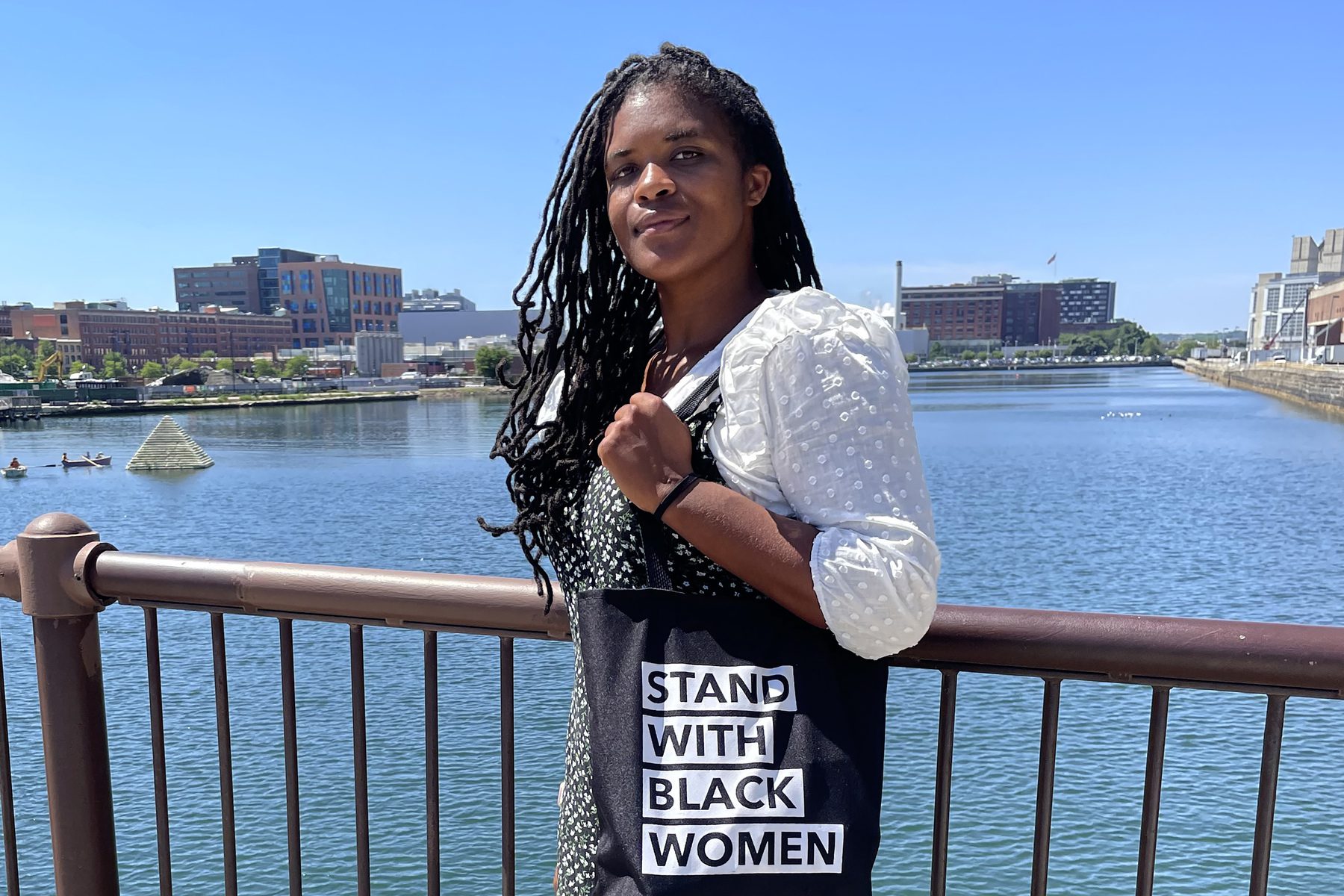Tiara Mack wanted to go viral on TikTok. The Rhode Island Democratic senator — a young queer Black woman elected to office in 2020 — had already been posting a variety of videos to the social media platform since joining in late June.
It was an effort to reach more voters, especially ahead of a reelection bid. She had recently been talking to viewers about policies she cares about, particularly abortion access and supporting grassroots funds aimed at helping people who can’t afford to pay for the medical procedure.
“I’m trying to go viral so I can talk to you more about abortion,” she said in one video.
So over the July 4th holiday weekend, the 28-year-old posted a video of herself twerking, upside down in a headstand, in a bathing suit on a beach.
“Vote Senator Mack,” she said with a smile in the roughly eight-second video.
The video did in fact go viral. To date it has more than 260,000 shares from her account and has been widely circulated elsewhere. The Rhode Island Republican Party fundraised off it with a donation plea online that featured a screenshot of Mack’s body as she twerked. Right-wing commentators, including media personality Tucker Carlson, weighed in. So did Republican Rep. Marjorie Taylor Greene of Georgia, who noted in a video criticizing Mack that she had also introduced a sex education bill that would require curriculum for students in grades 6 through 12 to “affirmatively recognize pleasure-based sexual relations, different sexual orientations and be inclusive of same-sex relationships in discussions and examples.”
“She’s so desperate for attention that she put out that video,” Greene said of Mack in the same video. “That’s why we made her demon possession of the week.”
Mack first received attention for the sex education bill months earlier, though she notes she introduced the bill in 2021 with little public traction. But after a wave of anti-LGBTQ+ bills this year, conservatives went after the legislation, which Mack says is age appropriate.
The attention on the twerking video has been a level of racist and sexist vitriol that has surprised Mack. She says she has received hateful messages on her social media accounts. At one point, her TikTok account was suspended, and Mack says it was due to people repeatedly reporting it.
Nearly a month later, Mack said the harassment and threats haven’t stopped.
“It’s been a whirlwind. Anywhere from misogynistic comments, racist comments, classist comments,” she said. “I’ve received death threats. I’ve received emails and phone calls of people calling me the n-word. I’ve received fatphobic comments. Just everything under the sun.”
The experience highlights the ongoing barriers to political representation for women, women of color and people from marginalized communities. And it also previews how online vitriol may dissuade people from the most vulnerable and underrepresented communities from running for office, experts say.
“This is all a deterrent for young women who might be considering political leadership,” said Jennie Sweet-Cushman, a political science professor at Chatham University in Pittsburgh. “And they know it. There will still be women, and there always have been, who are standard bearers who are willing to push back. But that requires so much more confidence and energy — all of these things that men just don’t need to have, especially White men.”
Mack, the only Black woman in the Rhode Island Senate and the first out LGBTQ+ Black person in the chamber, has tried to turn the messaging on its head, with a hashtag of twerking for civil rights issues that she cares about.
“Why is it that there’s such attention and such a devaluing of Black queer voices in this moment? Because they are different, they deviate from the norm,” she said. “Me twerking upside down as a young Black person wouldn’t have made a big deal if people didn’t see a senator who looks like her should not have power. A person with a body like hers should not have power. A young person, a queer person, a Black person who’s unapologetic about those identities should not be in a position of power.”
Sweet-Cushman agreed that there is an explicit bias to the political attacks against Mack.
“People are harsh toward women when they ‘step out of line’ and especially women of color, especially queer women, so she has the entire deck stacked against her,” she said. “The patriarchy is really threatened by a woman with those identities in a position of power. And so this is really just an excuse to embarrass her for making the ‘mistake’ of having political power.”
Amanda Litman is co-founder and executive director of Run for Something, a group that helps young Democratic candidates run for office and has endorsed Mack. Litman said when she tweeted support for Mack a few weeks ago following the attention over her twerking, her own mentions were quickly filled with hate.
“It’s not about the video she made. That is the excuse that they have found to grab onto. It’s about the fact that she is a queer Black woman who is fighting aggressively for reproductive rights, for sexual health, for LGBTQ equality,” Litman said. “They found the thing to be mad at, but what they’re really mad at is that someone like her is in charge.”
Mack is also critical of the response some Rhode Island Democratic leaders have had to her experience.
“The response has been silence. The same exact treatment that I got when I was called a pedophile and a groomer repeatedly for months,” she said, referencing the response to her sex education bill. “No one stood up for me. No one cared about my safety.”
Democrats control both chambers of the legislature. Senate President Dominick Ruggerio did not respond to a request for comment. A spokesperson for House leadership said lawmakers in that chamber typically do not comment on something involving a state senator.
A few weeks ago, U.S. Rep. Alexandria Ocasio-Cortez posted on social media about being catcalled while on the Capitol steps by a man who used sexist and racist remarks toward her.
“It’s just a bummer to work in an institution that openly allowed this, but talking about it only invites more. Just really sad,” she wrote.
Litman said there are some parallels to the experiences.
“By simply being there, they’re challenging the status quo. So the status quo doesn’t necessarily have their back,” she said.
Kelly Dittmar is director of research at the Center for American Women and Politics. During a briefing with reporters last week, she mentioned that the organization is funding projects to better study violence against women in politics, including women of color.
Dittmar pointed to research that shows as women gain political power, they often face more harassment. Dittmar added that women candidates appear to be talking more openly about their experiences with harassment, bringing more attention to the phenomenon.
“So then the next question becomes, how do we actually address it? So I don’t think we have the best data, but I think we’re finally having more of a public dialogue about it. And know that this is not new, or necessarily more than before. It’s just that there’s more attention to it and the avenues by which that violence and harassment can happen — including on the internet — there are more of those avenues.”
Mack said there is a tension in that shift to a younger generation of people seeking and winning office. She noted that in 2020 she defeated a 30-year incumbent from her own party who opposed abortion. She said she ran for office because she wanted to better support LGBTQ+ people and advocate for justice. And she remains committed to reelection, with efforts including door knocking and community events.
But she also wanted to acknowledge the realities of the work.
“I think as someone who’s directly experiencing this, I can see why there isn’t longevity of Black and Brown women in politics, because this isn’t sustainable for mental health,” she said. “There’s a reason why White cis men thrive in politics and it’s only been catered toward them. Because they’ve created a hostile environment for anyone else.”







